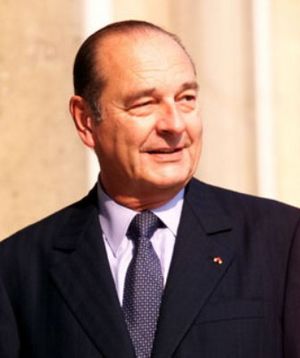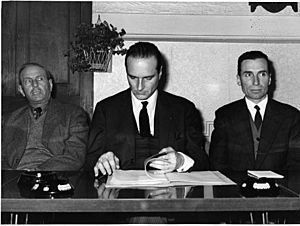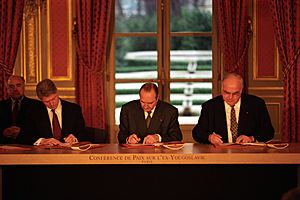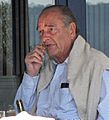Jacques Chirac facts for kids
Quick facts for kids
Jacques Chirac
|
|
|---|---|
 |
|
| President of France | |
| In office 17 May 1995 – 16 May 2007 |
|
| Prime Minister | Alain Juppé Lionel Jospin Jean-Pierre Raffarin Dominique de Villepin |
| Preceded by | François Mitterrand |
| Succeeded by | Nicolas Sarkozy |
| Prime Minister of France | |
| In office 20 March 1986 – 10 May 1988 |
|
| President | François Mitterrand |
| Preceded by | Laurent Fabius |
| Succeeded by | Michel Rocard |
| In office 27 May 1974 – 26 August 1976 |
|
| President | Valéry Giscard d'Estaing |
| Preceded by | Pierre Messmer |
| Succeeded by | Raymond Barre |
| Mayor of Paris | |
| In office 20 March 1977 – 16 May 1995 |
|
| Preceded by | Office re-established |
| Succeeded by | Jean Tiberi |
| President of Rally for the Republic | |
| In office 5 December 1976 – 4 November 1994 |
|
| Preceded by | Office established |
| Succeeded by | Alain Juppé |
| Minister of the Interior | |
| In office 27 February 1974 – 28 May 1974 |
|
| Prime Minister | Pierre Messmer |
| Preceded by | Raymond Marcellin |
| Succeeded by | Michel Poniatowski |
| Minister of Agriculture and Rural Development | |
| In office 7 July 1972 – 27 February 1974 |
|
| Prime Minister | Pierre Messmer |
| Preceded by | Michel Cointat |
| Succeeded by | Raymond Marcellin |
| Minister for Parliamentary Relations | |
| In office 7 January 1971 – 5 July 1972 |
|
| Prime Minister | Jacques Chaban-Delmas |
| Preceded by | Roger Frey |
| Succeeded by | Robert Boulin |
| President of the Corrèze General Council | |
| In office 15 March 1970 – 25 March 1979 |
|
| Preceded by | Elie Rouby |
| Succeeded by | Georges Debat |
| Personal details | |
| Born |
Jacques René Chirac
29 November 1932 Paris, French Third Republic |
| Died | 26 September 2019 (aged 86) Paris, France |
| Political party | Communist Party (Before 1962) Union for the New Republic (1962–1968) Union of Democrats for the Republic (1968–1971) Rally for the Republic (1971–2002) Union for a Popular Movement (2002–2007) |
| Signature |  |
| Military service | |
| Allegiance | |
| Branch/service | French Army |
| Years of service | 1954–1957 |
Jacques René Chirac (born November 29, 1932 – died September 26, 2019) was a French politician. He served as the President of France from 1995 to 2007. During this time, he was also a Co-Prince of Andorra.
Before becoming president, Chirac was the Prime Minister of France twice. He held this role from 1974 to 1976 and again from 1986 to 1988. He also served as the Mayor of Paris from 1977 to 1995.
Chirac studied at important schools like Sciences Po and the École nationale d'administration. He started his career working for the government. Soon after, he entered politics. He held many important jobs, including Minister of Agriculture and Minister of the Interior.
As Prime Minister, Chirac first supported policies like lower taxes and less government control over prices. Later, he changed his mind. He began to support policies that focused more on helping people and society. He was elected President in 1995. He won against Lionel Jospin by promising to fix social problems in France.
Chirac was known for his strong stand against the American-led war in Iraq. He also officially recognized France's past role in deporting Jewish people. He changed the presidential term from seven years to five years through a public vote in 2000.
In the 2002 French presidential election, he won by a large margin. He received 82.2% of the votes against Jean-Marie Le Pen. However, during his second term, many people were not happy with his leadership. He became one of the least popular presidents in recent French history.
Contents
Early Life and Education
Jacques Chirac was born in Paris. His father, Abel François Marie Chirac, was a successful executive at an aircraft company. His mother, Marie-Louise Valette, was a housewife. Both of his grandfathers were teachers. Chirac said his family name came from old French poets called troubadours. He was a Roman Catholic.
He went to private schools in Paris, including Cours Hattemer. He also attended Lycée Carnot and Lycée Louis-le-Grand. After finishing high school, he worked for three months as a sailor.
Chirac enjoyed playing rugby union. He played for a youth team and also at university.
In the 1950s, Chirac was inspired by General Charles de Gaulle. He decided to work for the government. He studied at the Paris Institute of Political Studies and then at the École nationale d'administration (ENA). The ENA is a special school that trains France's top government workers.
While in the United States, Chirac worked at a company called Anheuser-Busch.
Chirac also trained as a military officer. He volunteered to fight in the Algerian War. After leaving the ENA in 1959, he became a civil servant.
In 1956, he married Bernadette Chodron de Courcel. They had two daughters together.
Key Moments as President
Surviving an Attack
On July 14, 2002, during Bastille Day celebrations, Chirac faced a scary moment. A man with a rifle tried to shoot him. The attacker fired a shot towards Chirac's car parade. Luckily, people nearby quickly stopped the gunman.
The attacker, Maxime Brunerie, had mental health issues. The far-right group he was linked to was later shut down by the government.
Focus on Climate Change
In July 2006, the G8 group of leading countries met to talk about energy. Even though people were becoming more aware of global warming, the G8 mostly focused on energy safety.
Chirac, however, kept pushing for action on climate change. He warned that "humanity is dancing on a volcano". He urged the world's most developed countries to take serious steps to protect the environment.
After His Presidency
After leaving office in 2007, Chirac started the Fondation Chirac in June 2008. This foundation works for peace. It has five main goals: preventing conflicts, making sure people have clean water and sanitation, providing good medicines and healthcare, helping people access land resources, and protecting different cultures.
The foundation supports projects that involve local people. These projects offer practical and new solutions to problems. Chirac led the jury for a special award given each year by his foundation for conflict prevention.
Later Life and Death
For several years before his death, Jacques Chirac had problems with his memory. These issues were thought to be related to a form of Alzheimer's disease or a minor stroke he had while in office. He had several health problems after he left the presidency in 2007.
Jacques Chirac passed away at his home in Paris on September 26, 2019.
Images for kids
-
Chirac with Bill Clinton outside the Élysée Palace in Paris, June 1999
-
Chirac with Russian President Vladimir Putin, 2001
-
Chirac and George W. Bush during the 27th G8 summit, July 21, 2001
-
Chirac with German Federal Chancellor Gerhard Schröder, 2003
-
Chirac greets the then President of Brazil, Luiz Inácio Lula da Silva and wife Marisa Letícia during a ceremony in Brasília, Brazil, on May 25, 2006.
-
Chirac with George W. Bush, Gerhard Schröder, Vladimir Putin, Junichiro Koizumi and other state leaders in Moscow, May 9, 2005
See also
 In Spanish: Jacques Chirac para niños
In Spanish: Jacques Chirac para niños
 | James Van Der Zee |
 | Alma Thomas |
 | Ellis Wilson |
 | Margaret Taylor-Burroughs |














